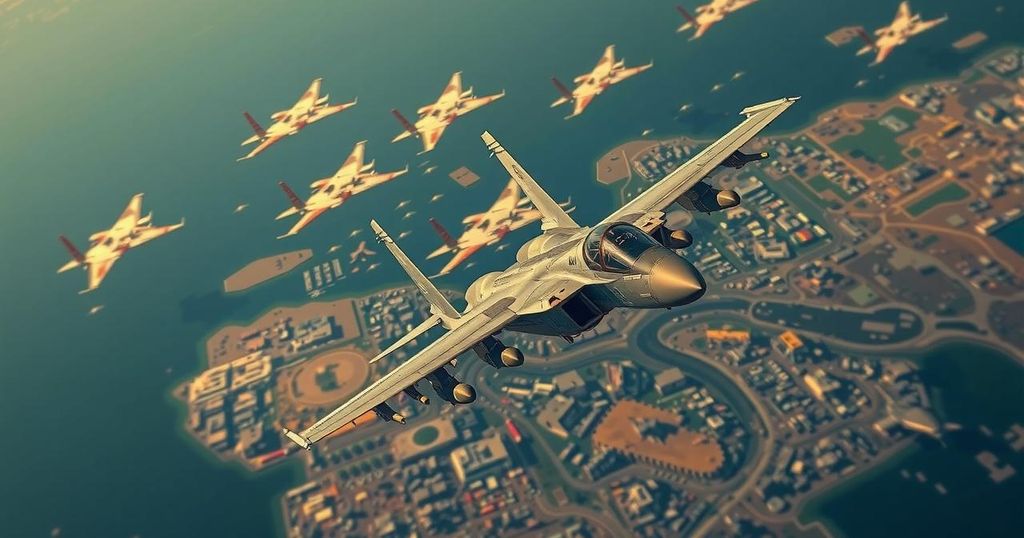Turkey Conducts Air Strikes in Iraq and Syria Following Attack on Defense Company

In response to an attack on TUSAS, a defense company, Turkey launched air strikes against PKK targets in Iraq and Syria, resulting in the destruction of 32 sites. The government firmly blames the PKK for the violence and vows to continue its military operations until the last terrorist is eliminated. This incident complicates ongoing discussions of potential peace and dialogue with Kurdish representatives.
On Wednesday, Turkey’s Air Force conducted air strikes against Kurdish targets in Iraq and Syria, marking a significant military action in response to the recent assault on TUSAS, a key aerospace and defense company near Ankara. This attack resulted in the deaths of five individuals and injuries to over twenty others, leading the Turkish government to swiftly retaliate against the Kurdistan Workers’ Party (PKK), which has been identified as the perpetrator of the bombing. The Turkish Ministry of National Defense reported that 32 targets had been “destroyed” during the operation, emphasizing that comprehensive measures were undertaken to mitigate civilian casualties, although specific details regarding the locations of the strikes were not disclosed. Interior Minister Ali Yerlikaya and Defence Minister Yasar Guler both pointed fingers at the PKK, with Guler stating, “We give these PKK scoundrels the punishment they deserve every time. But they never come to their senses. We will pursue them until the last terrorist is eliminated.” The assault on TUSAS occurred shortly after discussions regarding a potential parole for the PKK’s imprisoned leader Abdullah Ocalan, contingent on his renouncement of violence and the disbandment of his organization. Such political discussions occur against a backdrop of ongoing tensions and violence in the region. President Recep Tayyip Erdogan expressed condemnation of the attack during discussions with Russian President Vladimir Putin, reinforcing Turkey’s stance against terrorism. Meanwhile, Iraq’s embassy in Turkey condemned the attack, reiterating Iraq’s commitment to combatting terrorism. Turkey has a history of conducting air strikes against the PKK in Iraq and Syria in its efforts to counter Kurdish militant groups. The UAVs developed by TUSAS have played a crucial role in Turkey’s military strategy against Kurdish insurgents, deepening the complexities of the conflict which has persisted since the 1980s, leading to extensive loss of life. The main pro-Kurdish party in Turkey also condemned the attack, suggesting that such incidents hinder the ongoing dialogue aimed at resolving long-standing issues. Observers now question the feasibility of achieving peace in light of these escalating tensions.
The conflict involving the PKK and Turkish state has deep historical roots, having evolved over several decades. The PKK, which advocates for Kurdish autonomy in southeastern Turkey, has been designated a terrorist organization by both Turkey and various Western nations. The friction between the Turkish government and the Kurdish population has resulted in significant violence and loss of life. The recent attack on TUSAS has escalated tensions further, complicating prospects for dialogue and peace negotiations that have sporadically emerged. Turkey’s regular military operations against the PKK and its affiliates underscore its commitment to suppress what it considers a separatist threat to its national security.
In conclusion, Turkey’s military response to the recent attack on the TUSAS defense company reflects its ongoing struggle against the PKK and highlights the complexities of the Kurdish issue within the country. The government’s commitment to defending national interests inevitably clashes with the prospects for peace and dialogue. The ramifications of this latest incident may further entrench the cycle of violence, raising significant concerns regarding future negotiations and the resolution of long-standing grievances between the Turkish state and its Kurdish population.
Original Source: www.aljazeera.com








